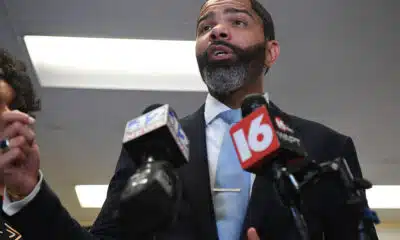Mississippi Today
Mississippi is investing millions of dollars in high school career coaches. Here’s how it works.
Mississippi is investing millions of dollars in high school career coaches. Here’s how it works.
PASCAGOULA – Aaliyah Jackson almost didn’t make it to her job interview at Ingalls Shipbuilding on a recent Monday morning.
The 18-year-old St. Martin High School senior was pumping gas when a faulty latch sent gasoline spraying all over her only professional dress. Panicked and shaking, she took out her phone and dialed the one person she knew would know what to do: Mrs. Marvin.
That’s her high school career coach. The one who helped her prepare for Ingalls’ first-ever high school career fair. Jackson hopes to land a job sandblasting ships.
“I don’t have a lot of professional clothes. So I texted her, having a panic attack, covered in gas, asking what I should do,” she said.
Brittini Marvin, per usual, knew what to say. She told Jackson to go home and clean up. She reminded her it would be ok, even if she missed the school bus taking students to the interviews.

After quickly washing her dress at home, Jackson made it on the bus on time to ride with her coach to the Ingalls offices. And Marvin wasn’t far during the whole process: cheering Jackson on between a written test, physical test and interview.
“I love her,” Jackson said. “I didn’t even know what a resume really was before I went to her office.”
Jackson County has one of the most thorough career coaching programs in the state that goes by the name “P3,” short for “purpose, passion, and paycheck.” The first iteration of a similar program launched about six years ago in northeast Mississippi, funded by grant money from Toyota.
The programs use career coaches hired from outside the school system — but stationed within a high school — to help students develop a post-grad plan. P3, for example, focuses on its students having one of “three Es”: enrollment (into higher education), employment, or enlistment.
Meanwhile, a statewide career coaching program has been steadily unrolling as a way to confront Mississippi’s ongoing struggles to increase the workforce participation rate and get young Mississippians into high-paying and in-demand jobs. Last session, the Legislature designated $8 million in American Sovereignty Restoration Act Funds for the statewide version of the program.
Now that funding could double. Gov. Tate Reeves’ legislative budget proposal included the recommendation to up the program’s funding to $16 million through general state funds.
The statewide program is run by the workforce development office, Accelerate Mississippi. The state had 25 coaches — including those in Jackson County — before last year’s funding. By mid-January, there will be 140 coaches, according to the workforce development office.
“We’ve been watching what’s happening in Jackson County and what had already been going on in the northeast part of the state,” said Garrett McInnis, Accelerate Mississippi’s deputy director of external affairs. “It was the right place and right time to expand the concept and now we have something that has the potential to positively impact a lot of people and make us more competitive as a state.”
The access to career coaches was vital for students like Jackson, who graduated early with a last day of school on Dec. 16. Without help to form a plan and set up a job for after graduation, Jackson worries she could have felt stuck at her current job at Taco Bell.

She is confident enough that she’d start training for a new job at Ingalls come January; she already put her two-weeks notice in at the fast-food joint.
Jackson County’s success over the last two years, with help from its local chamber of commerce and economic development office, has set a roadmap for the budding statewide program to follow. Career coaches say their advice is catered to every type of student — not just those looking for guidance for in-demand trades like at the Ingalls career fair.
“As career coaches we work with the private and public sectors,” said Amanda Stubbs, a coach at Gautier High School. “We have brought in Ingalls, Chevron, health care workers, counselors, attorneys. We take students on tours and to meet CEOs. The more our students know, the more they can grow.”
Ava McRaney, 17 and a senior at Vancleave High School, may be her class’ valedictorian but she still felt lost when it came to sorting out how to set up a path to become the first physician in her family. She wound up making an appointment with the school’s career coach, Kim Wiley.
“I don’t know if I would have been applied to colleges already if it wasn’t for her,” McRaney said.
Wiley set up for McRaney to talk to a medical student about exactly what steps to take during undergraduate college — even carving out what time of year to study for the MCATs — in order to make her dreams a reality.
“She walked away feeling confident, knowing this is exactly what I need to do,” Wiley said. “She has a plan in place and knows how to move forward.”
Through the program’s connections to the community, McRaney was able to meet Singing River hospital’s CEO and shadow surgeons in November.
“I loved every second of the surgeries and I couldn’t take my eyes off what was happening,” McRaney said. “I got to be in the actual operating room. It was just an awesome experience and if I didn’t have that, I’d probably still feel unsure of everything.”
McRaney already received an acceptance letter from the University of Mississippi. She hopes to one day be an orthopedic surgeon.
Valerie Jerde, 18 and an early-graduate senior at Pascagoula High School, was at Ingalls’ recent job fair applying to work as a joiner, or a ship’s craftsman. Jerde recently found out she is pregnant. She wants a well-paying career to provide for her new family.
“I could see myself growing at Ingalls,” she said. “But I have always been taught not to keep my eggs in one basket.”
That’s why she’s grateful for the strong connection she’s built with career coach Shunda Williams. Jerde says she knows the coach will be there if she needs career or life advice even when she’s no longer a student.

“She’s a role model,” Jerde said.
Unlike high school counselors, the career coaches salaries aren’t paid by the school district. They can’t get called in to proctor a test or substitute teach a class. Their schedule is fully dedicated to helping students plan career paths.
The American Schools Counselor Association recommends a ratio of 250 students to one counselor. In reality, the national average for that ratio is more like 415-to-1. The career coaches add to a student’s team to ensure fewer are leaving Mississippi high schools without a job or pathway to a job in place.
The coaches say they’re often intervening to help break cycles of poverty, whether that means buying interview clothes for a student who cannot afford their own or helping a family fill out a Free Application for Federal Student Aid (commonly called FAFSA) so a student can enroll in community college.
McInnis with Accelerate Mississippi said by January, 51 of Mississippi’s 82 counties will have career coaches in their schools.
“It’s not nearly enough,” he said. “We need more.
This article first appeared on Mississippi Today and is republished here under a Creative Commons license.
Mississippi Today
Jackson’s performing arts venue Thalia Mara Hall is now open
After more than 10 months closed due to mold, asbestos and issues with the air conditioning system, Thalia Mara Hall has officially reopened.
Outgoing Mayor Chokwe A. Lumumba announced the reopening of Thalia Mara Hall during his final press conference held Monday on the arts venue’s steps.
“Today marks what we view as a full circle moment, rejoicing in the iconic space where community has come together for decades in the city of Jackson,” Lumumba said. “Thalia Mara has always been more than a venue. It has been a gathering place for people in the city of Jackson. From its first class ballet performances to gospel concerts, Thalia Mara Hall has been the backdrop for our city’s rich cultural history.”
Thalia Mara Hall closed last August after mold was found in parts of the building. The issues compounded from there, with malfunctioning HVAC systems and asbestos remediation. On June 6, the Mississippi State Fire Marshal’s Office announced that Thalia Mara Hall had finally passed inspection.
“We’re not only excited to have overcome many of the challenges that led to it being shuttered for a period of time,” Lumumba said. “We are hopeful for the future of this auditorium, that it may be able to provide a more up-to-date experience for residents, inviting shows that people are able to see across the world, bringing them here to Jackson. So this is an investment in the future.”
In total, Emad Al-Turk, a city contracted engineer and owner of Al-Turk Planning, estimates that $5 million in city and state funds went into bringing Thalia Mara Hall up to code.
The venue still has work to be completed, including reinstalling the fire curtain. The beam in which the fire curtain will be anchored has asbestos in it, so it will have to be remediated. In addition, a second air-conditioning chiller needs to be installed to properly cool the building. Until it’s installed, which could take months, Thalia Mara Hall will be operating at a lower seating capacity of about 800.
“Primarily because of the heat,” Al-Turk said. “The air conditioning would not be sufficient to actually accommodate the 2,000 people at full capacity, but starting in the fall, that should not be a problem.”
Al-Turk said the calendar is open for the city to begin booking events, though none have been scheduled for July.
“We’re very proud,” he said. “This took a little bit longer than what we anticipated, but we had probably seven or eight different contractors we had to coordinate with and all of them did a superb job to get us where we are today.”
This article first appeared on Mississippi Today and is republished here under a Creative Commons Attribution-NoDerivatives 4.0 International License.
The post Jackson’s performing arts venue Thalia Mara Hall is now open appeared first on mississippitoday.org
Note: The following A.I. based commentary is not part of the original article, reproduced above, but is offered in the hopes that it will promote greater media literacy and critical thinking, by making any potential bias more visible to the reader –Staff Editor.
Political Bias Rating: Centrist
The article presents a straightforward report on the reopening of Thalia Mara Hall in Jackson, focusing on facts and statements from city officials without promoting any ideological viewpoint. The tone is neutral and positive, emphasizing the community and cultural significance of the venue while detailing the challenges overcome during renovations. The coverage centers on public investment and future prospects, without partisan framing or editorializing. While quotes from Mayor Lumumba and a city engineer highlight optimism and civic pride, the article maintains balanced, factual reporting rather than advancing a political agenda.
Mississippi Today
‘Hurdles waiting in the shadows’: Lumumba reflects on challenges and triumphs on final day as Jackson mayor
On his last day as mayor of Jackson, Chokwe Antar Lumumba recounted accomplishments, praised his executive team and said he has no plans to seek office again.
He spoke during a press conference outside of the city’s Thalia Mara Hall, which was recently cleared for reopening after nearly a year of remediation. The briefing, meant to give media members a peek inside the downtown theater, marked one of Lumumba’s final forays as mayor.
Longtime state Sen. John Horhn — who defeated Lumumba in the Democratic primary runoff — will be inaugurated as mayor Tuesday, but Lumumba won’t be present. Not for any contentious reason, the 42-year-old mayor noted, but because he returns to his private law practice Tuesday.
“I’ve got to work now, y’all,” Lumumba said. “I’ve got a job.”
Thalia Mara Hall’s presumptive comeback was a fitting end for Lumumba, who pledged to make Jackson the most radical city in America but instead spent much of his eight years in office parrying one emergency after another. The auditorium was built in 1968 and closed nearly 11 months ago after workers found mold caused by a faulty HVAC system – on top of broken elevators, fire safety concerns and vandalism.
“This job is a fast-pitched sport,” Lumumba said. “There’s an abundance of challenges that have to be addressed, and it seems like the moment that you’ve gotten over one hurdle, there’s another one that is waiting in the shadows.”
Outside the theater Monday, Lumumba reflected on the high points of his leadership instead of the many crises — some seemingly self-inflicted — he faced as mayor.
He presided over the city during the coronavirus pandemic and the rise in crime it brought, but also the one-two punch of the 2021 and 2022 water crises, exacerbated by the city’s mismanagement of its water plants, and the 18-day pause in trash pickup spurred by Lumumba’s contentious negotiations with the city council in 2023.
Then in 2024, Lumumba was indicted alongside other city and county officials in a sweeping federal corruption probe targeting the proposed development of a hotel across from the city’s convention center, a project that has remained stalled in a 20-year saga of failed bids and political consternation.
Slated for trial next year, Lumumba has repeatedly maintained his innocence.
The city’s youngest mayor also brought some victories to Jackson, particularly in his first year in office. In 2017, he ended a furlough of city employees and worked with then-Gov. Phil Bryant to avoid a state takeover of Jackson Public Schools. In 2019, the city successfully sued German engineering firm Siemens and its local contractors for $89 million over botched work installing the city’s water-sewer billing infrastructure.
“I think that that was a pivotal moment to say that this city is going to hold people responsible for the work that they do,” Lumumba said.
Lumumba had more time than any other mayor to usher in the 1% sales tax, which residents approved in 2014 to fund infrastructure improvements.
“We paved 144 streets,” he said. “There are residents that still are waiting on their roads to be repaved. And you don’t really feel it until it’s your street that gets repaved, but that is a significant undertaking.”
And under his administration, crime has fallen dramatically recently, with homicides cut by a third and shootings cut in half in the last year.
Lumumba was first elected in 2017 after defeating Tony Yarber, a business-friendly mayor who faced his own scandals as mayor. A criminal justice attorney, Lumumba said he never planned to seek office until the stunning death of his father, Chokwe Lumumba Sr., eight months into his first term as mayor in 2014.
“I can say without reservation, and unequivocally, we remember where we started. We are in a much better position than we started,” Lumumba said.
Lumumba said he has sat down with Horhn in recent months, answered questions “as extensively as I could,” and promised to remain reachable to the new mayor.
This article first appeared on Mississippi Today and is republished here under a Creative Commons Attribution-NoDerivatives 4.0 International License.
The post 'Hurdles waiting in the shadows': Lumumba reflects on challenges and triumphs on final day as Jackson mayor appeared first on mississippitoday.org
Note: The following A.I. based commentary is not part of the original article, reproduced above, but is offered in the hopes that it will promote greater media literacy and critical thinking, by making any potential bias more visible to the reader –Staff Editor.
Political Bias Rating: Center-Left
The article reports on outgoing Jackson Mayor Chokwe Antar Lumumba’s reflections without overt editorializing but subtly frames his tenure within progressive contexts, emphasizing his self-described goal to make Jackson “the most radical city in America.” The piece highlights his accomplishments alongside challenges, including public crises and a federal indictment, maintaining a factual tone yet noting contentious moments like labor disputes and governance issues. While it avoids partisan rhetoric, the focus on social justice efforts, infrastructure investment, and crime reduction, as well as positive framing of Lumumba’s achievements, aligns with a center-left perspective that values progressive governance and accountability.
Mississippi Today
Feds unfreeze $137 million in Mississippi education money
The federal government is restoring $137 million in education funds to Mississippi schools.
The U.S. Department of Education notified states last week that it would reinstate pandemic relief funds. The decision comes less than three months after the federal government revoked billions nationwide as part of Trump administration efforts to cut government spending.
State education agencies and school districts originally had until March 2026 to spend the money, but the federal government claimed that because the pandemic was over, they had no use for the money.
That March 2026 deadline has been reinstated following a series of injunctive orders.
A coalition of Democratic-led states sued the federal government in April over the decision to withhold the money. Then, a federal judge granted plaintiff states injunctive orders in the case, which meant those states could continue spending their COVID-relief dollars while other states remained restricted.
But the education department decided that wasn’t fair, wrote Secretary Linda McMahon in a letter dated June 26, so the agency was restoring the money to all states, not just the ones involved in the lawsuit.
“The original intent of the policy announced on March 28 was to treat all states consistently with regards to safeguarding and refocusing their remaining COVID-era grant funding on students,” she wrote. “The ongoing litigation has created basic fairness and uniformity problems.”
The Mississippi Department of Education notified school districts about the decision on Friday.
In the meantime, schools and states have been requesting exemptions for individual projects, though many from across the country have been denied.
Eleven Mississippi school districts had submitted requests to use the money to fund services such as tutoring and counseling, according to records requested by Mississippi Today, though those are now void because of the federal government’s decision.
Starting immediately, school districts can submit new requests to the state education department to draw down their federal allocation.
Mississippi Today previously reported that about 70 school districts were relying on the federal funds to pay for a range of initiatives, including construction projects, mental health services and literacy programs.
In 2023, almost half of Elementary and Secondary School Emergency Relief funds, pandemic relief money allocated to schools across the country, went to students’ academic, social, and emotional needs. A third went to operational and staff costs, according to a report from the U.S. Department of Education.
Though Lt. Gov. Delbert Hosemann previously said that legislative leaders might consider helping agencies that were impacted by federal funding cuts, House Speaker Jason White said Monday that he did not have an appetite for directing state funds to pandemic-era programs.
Small school districts were already feeling the impact of the federal government’s decision to rescind the money. In May, Greenwood Leflore Consolidated School Board voted to terminate a contract on a school construction project funded with federal dollars.
The litigation is ongoing, so the funding could again be rescinded.
Clarification: A previous version of this article misstated the status of school districts’ pandemic relief money.
This article first appeared on Mississippi Today and is republished here under a Creative Commons Attribution-NoDerivatives 4.0 International License.
The post Feds unfreeze $137 million in Mississippi education money appeared first on mississippitoday.org
Note: The following A.I. based commentary is not part of the original article, reproduced above, but is offered in the hopes that it will promote greater media literacy and critical thinking, by making any potential bias more visible to the reader –Staff Editor.
Political Bias Rating: Centrist
This article primarily reports on the federal government’s decision to restore $137 million in education funds to Mississippi schools after a temporary freeze. It presents factual information about the timeline, legal actions, and responses from various state officials without adopting a partisan tone. The piece mentions the involvement of Democratic-led states suing the federal government and notes Republican-aligned efforts to cut spending, but does so in a balanced way focused on reporting events and statements rather than promoting a political viewpoint. The language remains neutral and factual, avoiding loaded or biased framing, making it a straightforward news report with centrist bias.
-
Mississippi Today5 days ago
Defendant in auditor’s ‘second largest’ embezzlement case in history goes free
-
News from the South - Louisiana News Feed7 days ago
3 lawsuits filed against CVS, Louisiana AG announces
-
Our Mississippi Home6 days ago
From ‘I’m Bored’ to ‘Let’s Explore’: A Summer Scavenger Hunt Through Mississippi History
-
News from the South - Missouri News Feed7 days ago
Residents provide feedback in Kearney Street Corridor redevelopment meeting
-
News from the South - Louisiana News Feed7 days ago
Louisiana’s energy efficiency ‘slush fund’: $80 million, few rules
-
News from the South - Texas News Feed6 days ago
The Rio Grande Valley as Heart of LGBTQ+ Resistance and Joy
-
News from the South - Georgia News Feed4 days ago
Are you addicted to ‘fridge cigarettes’? Here’s what the Gen Z term means
-
News from the South - Arkansas News Feed7 days ago
Tribal organizations releases archaeological study over proposed Franklin County prison site



















































